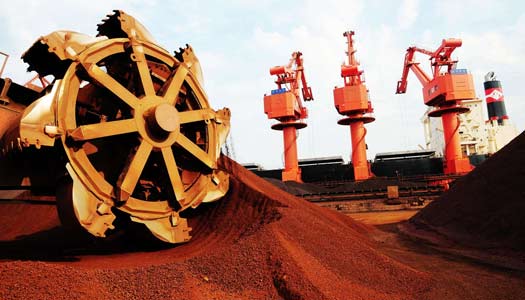Private firms eye overseas mining sector
Updated: 2012-11-06 09:45
|
 |
|
Machines are in use to load iron ore at Qingdao Port, March 26, 2012. [Yu Fangping/Asianewsphoto] |
As private Chinese companies invest more in overseas resources projects, they are seeing advantages from a new source: the acceleration in the global use of the renminbi.
Private mining companies, with the support of domestic banks, should seize opportunities they now have in the overseas resources industry, said Guo Jianwei, deputy director-general at the monetary policy department of the People's Bank of China, at the 2012 China Mining Expo in Tianjin over the weekend.
He also called on banks to pursue a "going-global strategy" and provide complementary services to those companies. Guo said the global use of the renminbi will encourage private companies to make direct investments in foreign countries, adding that domestic banks should prepare for that eventuality.
From 2008 to 2009, private companies invested heavily in the overseas mining industry. But because of the complicated approval process companies must go through to use foreign currency in overseas investments, they also missed many opportunities, Guo said.
That obstacle will be overcome as the renminbi becomes more internationalized, enabling private Chinese companies to make direct investments both domestically and abroad using a renminbi financing system. That will help feed investors' enthusiasm for the overseas mining industry and accelerate the internationalization of the renminbi.
By the end of September, 97.8 billion yuan ($15.5 billion) worth of loans had been approved to be issued from the overseas yuan-financing system, according to figures from the People's Bank of China, the country's central bank.
China began to invest more overseas in recent years, and the percentage of that investment coming from private capital has become larger as well.
In 2011, private companies made non-financial direct investments worth $30.78 billion. That was equal to 44.9 percent of the total investment from China, a percentage up 15.4 points year-on-year, according to statistics from the Ministry of Commerce.
About 13,500 domestic companies have established up to 18,000 companies abroad, among which about 90 percent are private enterprises. Their investments mainly go into mining.
Private mining-exploration companies in China had 14.05 billion yuan in annual revenue on average last year, four times more than the figure for 2007.
The average value of those private mining companies' assets increased from 2.7 billion yuan in 2007 to 18.47 billion yuan last year, according to figures from the All-China Federation of Industry and Commerce.
"The mining sector has become the fourth most attractive industry for China's private investors following the trading, services and financial industries," Yang Yihang, deputy director at the Ministry of Commerce's investment promotion agency, said during the expo.
"In the next 10 to 20 years, China's mining investments will continue to increase strongly as the country will continue to use a lot of mining resources," said Gan Fei, a researcher with the Chinese Academy of Land and Resource Economics.
He said China is making ever-larger private investments into the mining industry and those investments are coming in more and more diverse forms.
- BYD exports three electric cars to Thailand
- Grid gets first jolt of residential solar power
- US now largest buyer of China's exports
- China's outbound M&As on the rise
- Tobacco control may entail price, tax rises
- Quanzhou becomes pilot financial reform zone
- New automobiles shine at Geneva Motor Show
- World's longest high-speed rail 'on track'
- Jiugui Liquor involved in plasticizer scandal again
- Accident reignites school bus safety concerns
- China to revise labor law
- Trademark registration under scrutiny
- Dinner ban takes toll on liquor firms
- CIC tables bid for London's Chiswick Park
- Property buyers eye overseas market
- Call for law to protect personal information
- China to cut train ticket prices
- Christmas business
- Solar industry to get jolt from new policies
- KFC chicken under spotlight















